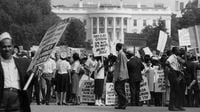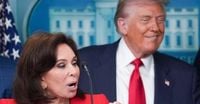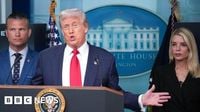On Monday, August 11, 2025, President Donald Trump set off a political firestorm by placing Washington, D.C.’s police department under direct federal control and deploying the National Guard to the nation’s capital. The move, which Trump described as a "historic action to rescue our nation's capital from crime, bloodshed, bedlam and squalor and worse," (NPR) marks the first time a president has federalized the Metropolitan Police Department (MPD) since the city gained limited self-governance in 1973. The president’s decision, announced in a news conference at the White House flanked by Attorney General Pam Bondi, has drawn sharp criticism from local officials and civil rights advocates, igniting debate over the limits of presidential authority, the accuracy of crime statistics, and the future of D.C. home rule.
Trump’s order, issued under the District of Columbia Home Rule Act, was accompanied by the deployment of 800 National Guard troops to bolster hundreds of federal law enforcement officers already in the city. According to the BBC, between 100 and 200 Guardsmen would be supporting law enforcement at any given time, with the deployment set for reevaluation in 30 days. The president insisted the measures were necessary to combat what he called "complete and total lawlessness," asserting that Washington had been overrun by "violent gangs and bloodthirsty criminals" as well as "drugged out maniacs and homeless people." (BBC) He further pledged to dismantle all remaining homeless encampments, warning that those who refused to comply could face jail time (CNN).
The president’s rhetoric stood in stark contrast to the facts on the ground. As reported by Axios and NPR, violent crime in Washington, D.C., has actually plummeted since a spike in 2023. Homicides dropped 32% between 2023 and 2024 and fell another 12% so far in 2025, reaching their lowest level since 2019. Metropolitan Police Department data shows that violent crime is at a 30-year low, and Mayor Muriel Bowser, a Democrat, has been quick to challenge the president’s claims. "We are not experiencing a crime spike," Bowser told MSNBC. "The president is very aware of our efforts." She acknowledged a "terrible" increase in crime post-COVID, but highlighted swift legislative action and policing reforms that contributed to the recent drop in violence. "We worked quickly to put laws in place that got violent offenders off our streets. We have seen a huge decrease in crime because of those efforts," Bowser said (BBC).
Trump’s move to federalize D.C. policing and deploy the National Guard is not without precedent in the city’s history, but it is unprecedented in its scope and context. As NPR explains, Washington, D.C., has long occupied an unusual constitutional status. Congress granted the city limited home rule in 1973, allowing residents to elect their own mayor and city council, but retained significant authority over local legislation, budgets, and certain emergency powers. The Home Rule Act allows the president to assume control of the police force in "special conditions of an emergency nature," but such takeovers have historically been rare and typically tied to financial or governance crises, not public safety in the face of declining crime rates.
Before home rule, D.C. was governed for nearly a century by presidentially appointed commissioners—a system that often marginalized the city’s majority-Black population and left residents without meaningful representation. In the 1990s, a federally appointed control board oversaw the city’s finances after a period of fiscal crisis, but even then, the MPD remained under local control. According to public historian Sarah Jane Shoenfeld, "I would hope that people understand that D.C. has a long history of effectively being able to govern itself. But I would also hope that people understand how difficult that has been for us because of the limitations of the Home Rule Act and how compromised our whole situation is." (NPR)
Trump’s actions have reignited the city’s long-running push for statehood. D.C. residents, who number nearly 700,000, overwhelmingly support becoming the 51st state, with 86% voting for statehood in a 2016 referendum. However, the proposal has repeatedly stalled in Congress. Some local leaders and activists see the president’s intervention as a wake-up call for the rest of the country. "Perhaps this will bring the issue to more peoples' attention around the country, that D.C. totally lacks the power to do anything in the face of what Trump's talking about," Shoenfeld told NPR.
Meanwhile, the president’s crackdown has not been limited to Washington. During his Monday announcement, Trump named Los Angeles, Baltimore, Oakland, New York, and Chicago as cities he intended to target for similar interventions. Yet, as Axios reports, crime rates in these cities have also dropped sharply in recent years. In Oakland, all violent crimes fell by 19% in 2024 compared to 2023, with homicides down 32% and burglaries down 48%. Chicago saw a 15% drop in crime since the elimination of cash bail, including a 37% decrease in murders. Baltimore’s violent crime fell 17% in the past year, while New York City’s overall crime index dropped 3% in 2024. Nationally, FBI data shows that murder was down 15% last year, the overall crime rate fell 5%, and robberies declined by 9%.
Trump has also made homelessness a central focus of his intervention. He has pledged to "get rid of the slums" in D.C., though he has not offered specifics on where displaced homeless individuals would be relocated. Local advocates like Ralph Boyd, CEO of So Others Might Eat, point out that homelessness in the city is actually down almost 20% for individuals compared to five years ago. Boyd warned that the president’s plan would simply "transfer the problem somewhere else into communities that are perhaps less equipped to deal with it than we are." (BBC)
The president’s actions have triggered legal and political pushback. Mayor Bowser has called the order "unsettling and unprecedented," expressing concern about the National Guard enforcing local laws. Democratic House Minority Leader Hakeem Jeffries declared that Trump’s move "has no basis in law," accusing the administration of violating the Constitution for political purposes. Outside the White House, protesters gathered with chants of "hands off DC" and "protect home rule," while a speaker at the event argued, "Trump does not care about DC's safety, he cares about control." (BBC)
Looking ahead, the White House has said the National Guard deployment will be reevaluated after 30 days. The coming weeks will also see President Trump meet Russian President Vladimir Putin in Anchorage, Alaska, for a summit described as a “listening exercise” on the war in Ukraine (CNN). But for now, the focus remains on the nation’s capital and the uncertain implications of this unprecedented federal intervention. As Washington’s residents and leaders grapple with the immediate effects, the episode has cast a harsh spotlight on the enduring tensions between local autonomy, presidential power, and the unique status of America’s only federal district.



